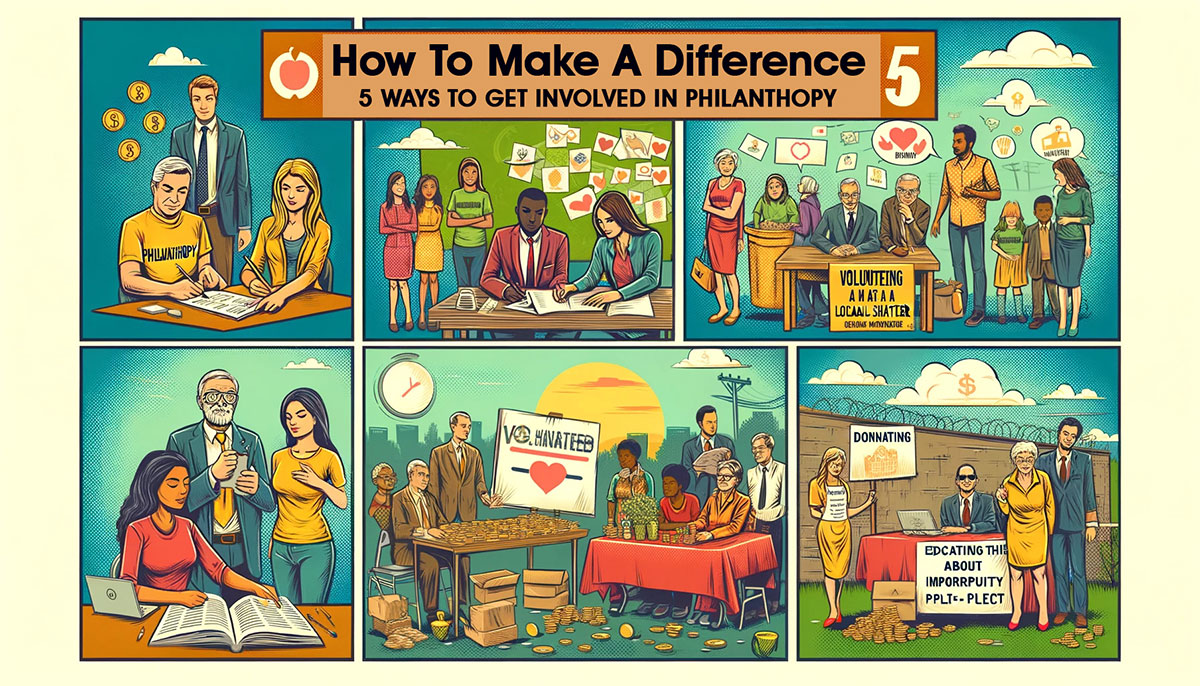Have you ever wanted to make a difference in the world but didn’t know where to start? Do you want to learn more about philanthropy and how it can impact society? If so, this guide is for you. In this article, we will cover everything from the basics of philanthropy to personal stories from people who are making a positive change in their communities. Let’s get started!
Introduction to Philanthropy
Philanthropy is the act of giving time, money or resources to support charitable causes. It comes from the Greek words “philo,” which means love, and “anthropos,” which means human being. Essentially, philanthropy is all about showing your love for humankind by helping others in need.
The Importance of Giving Back
There are many reasons why giving back is important. For one, it helps to address social issues that may not be getting enough attention from governments or other organizations. By supporting nonprofits and charities, you can help to provide essential services like healthcare, education, and housing to those who need them most. Additionally, philanthropy can also have a positive impact on your own well-being. Studies show that volunteering and donating to charity can improve mental health, reduce stress levels, and increase feelings of happiness and fulfillment.
Types of Charitable Organizations
There are many different types of charitable organizations out there, each with its unique mission and goals. Some examples include:
Humanitarian aid organizations: These groups focus on providing emergency relief to people affected by natural disasters, wars, or other crises.
Education foundations: These organizations work to improve access to quality education for underserved populations.
Healthcare institutions: Hospitals, clinics, and other healthcare providers often rely on philanthropic support to fund research, purchase equipment, and provide patient care.
Environmental conservation groups: These organizations aim to protect wildlife habitats, promote sustainable practices, and combat climate change.
How to Choose the Right Cause for You
With so many worthy causes out there, choosing the right one can feel overwhelming. Here are some tips to help you find a cause that aligns with your values and interests:
Consider your passions: Think about what matters most to you and what you feel strongly about. This could be anything from animal welfare to literacy rates. Once you identify your passion areas, look for organizations that match them.
Research potential organizations: Before donating to an organization, do your homework. Look into their mission statement, finances, and reputation to ensure they align with your values. Websites like GuideStar and Charity Navigator can be helpful for this purpose.
Get involved locally: Many cities and towns have local chapters of national nonprofit organizations. Getting involved at the community level can give you a chance to see firsthand the impact of your contributions.
Ways to Give: Time, Money or Resources
Once you’ve identified a cause you care about, there are several ways you can contribute. The three main forms of philanthropy are:
Volunteerism: Donating your time and skills to a nonprofit organization can be incredibly rewarding. Whether you choose to mentor young adults, serve meals at a soup kitchen, or participate in a beach cleanup, there are countless opportunities to get involved.
Monetary donations: Financial contributions are another way to support nonprofits. You can either make a one-time gift or set up recurring donations. Be sure to check if your employer offers matching gifts as well – this can double the impact of your contribution.
In-kind donations: Finally, consider donating goods or resources to a nonprofit. For example, you might donate clothing to a homeless shelter or office supplies to a school. Just remember to check with the organization before dropping off any items to ensure they meet their needs.
Measuring Impact and Efficiency in Nonprofits
One question many donors ask is whether their contributions are actually making a difference. To answer this question, nonprofits track metrics such as the number of people served, the amount of funds raised, and the impact of their programs. When evaluating a nonprofit, look for information on their website or annual report about their accomplishments and outcomes. Sites like Guidestar and Charity Navigator also offer ratings and reviews of nonprofits based on factors like financial transparency and effectiveness.
Personal Stories from People Who Make a Difference
To inspire you further, here are a few stories from individuals who have made a significant impact through philanthropy:
Bill Gates: As co-founder of Microsoft, Bill Gates has amassed great wealth. However, he and his wife Melinda have given away millions of dollars to fight poverty, disease, and hunger around the world through their foundation.
Oprah Winfrey: Media mogul Oprah Winfrey has been a longtime supporter of various charitable causes, including education, women’s rights, and animal welfare. She has donated millions of dollars to these causes and uses her platform to raise awareness about important issues.
Malala Yousafzai: At just 23 years old, Nobel Prize winner Malala Yousafzai has become a global advocate for girls’ education. After surviving an assassination attempt by the Taliban, she founded the Malala Fund to help girls around the world go to school and pursue their dreams.
Common Misconceptions About Philanthropy
Despite the benefits of philanthropy, there are still some common misconceptions about it. Here are a few myths debunked:
Only rich people can give back: While high-profile philanthropists like Bill Gates and Warren Buffett certainly make headlines, anyone can give back regardless of income level. Even small donations can add up and make a big difference.
Philanthropy is only for older people: Actually, millennials are leading the charge when it comes to philanthropy. According to a study by the Case Foundation, 84% of millennials donated to charity in 2019.
Philanthropy is selfish: Contrary to popular belief, philanthropy isn’t always about boosting one’s ego or image. Many donors prefer to remain anonymous, and studies show that giving back can lead to increased happiness and life satisfaction.
Conclusion
In conclusion, philanthropy is a powerful tool for creating positive change in the world. Whether you choose to volunteer, donate money or resources, or simply spread awareness about important causes, every little bit counts. Remember to do your research, follow your passions, and stay informed about the impact of your contributions. With these strategies in mind, you can make a real difference in the lives of others.



